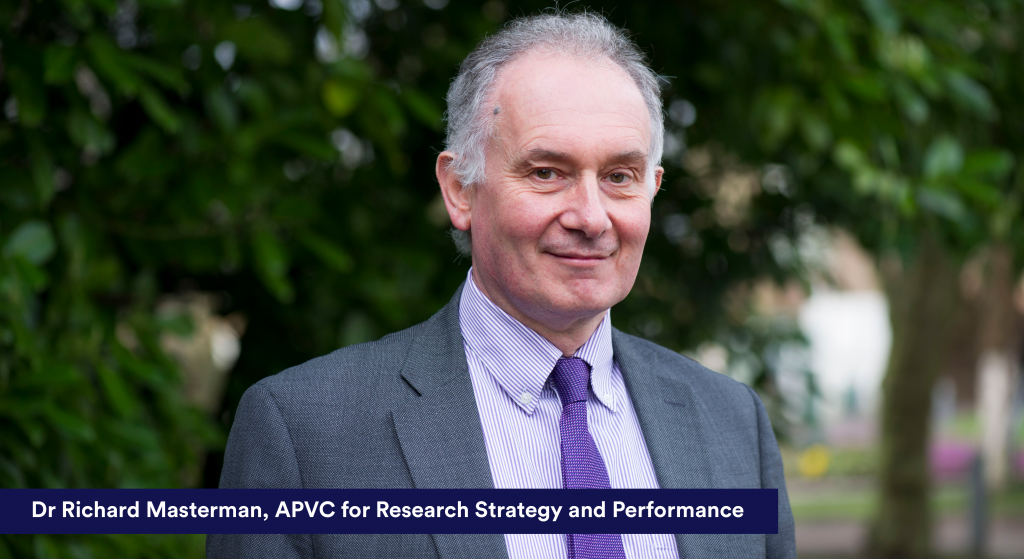
April 15, 2019, by Carla
Interdisciplinary discovery: the next step in our ambitious research vision
By Dr Richard Masterman
Global Research Themes and Interdisciplinary Research Clusters, 2019-22
Our capacity for interdisciplinary discovery is a core strength and a foundation of the University’s strategy for research.
In 2014, we established our Research Priority Areas (RPAs) to further encourage colleagues to collaborate across our schools and faculties.
RPAs have since enriched our research ecosystem.
By drawing together researchers, RPAs blur boundaries between disciplines while focusing our responses to complex challenges.
They raise the profile of our interdisciplinary research, attract funding and encourage recruitment of exceptional individuals who are excited by the opportunity of working with colleagues from across disciplines.
Since 2014:
- £5m has been invested in the Global Research Theme (GRT)/RPA programme
- 70% of colleagues have engaged with RPAs
- 106 funding awards have been made to RPAs between 2016 and 2018
- 600-plus research outputs identified
- More than 900 researchers are directly engaged with RPAs
The University has now set out an ambitious programme to build on the success of our RPAs and to ensure that our research ecosystem continues to evolve and deliver our vision for research.
RPAs will be replaced by Interdisciplinary Research Clusters (IRCs)
Interdisciplinary Research Clusters will allow us to further develop our capability to competitively address challenge-led research questions, which are often at the interface between disciplines.
This three-year programme to 2022 will build upon the current structure for supporting interdisciplinary research.
IRCs will be managed by GRT academic leads:
- Cultures and Communication: James Moran
- Developing Sustainable Societies: Sarah Metcalfe
- Health and Wellbeing: Victoria Chapman
- Transformative Technologies: Neil Champness
- Digital Frontiers: Natasa Milic-Frayling
with input from Faculty APVCs for Research and Knowledge Exchange
- Social Sciences: Andrew Noyes
- Engineering: Chris Tuck
- Science: Zoe Wilson
- Medicine and Health Sciences: Richard Emes
- Arts: Maiken Umbach and Lynda Pratt
and Directors of the Beacons of Excellence
- Future Food: David Salt
- Propulsion Futures: David Gant
- Green Chemicals: Alex Conradie
- Rights Lab: Zoe Trodd
- Precision Imaging: Dorothee Auer
- Smart Products: Steve Benford
Aims of GRT/IRC programme
- Bridge school, faculty and campus boundaries by seeding and pump-priming interdisciplinary research initiatives
- Establish the next generation of cutting-edge research programmes by supporting the emergence of ambitious interdisciplinary research initiatives
- Enhance our ability to respond to a changing policy and funding landscape
- Increase outputs, income, impact and reputation
- Help deliver REF, particularly its evaluation of our research environment
IRC portfolio and next steps for existing RPAs
The existing portfolio of 29 RPAs will be reviewed.
GRT leads will distribute a business case template to RPA leads with guidance on the requirements for an IRC.
RPAs can apply to be an IRC in line with the guidance.
It is expected that new areas will also apply to become IRCs, and that there will be around 20-25 IRCs in total, to allow for flexibility and for new IRCs to emerge in the future. Any IRCs that have a business case but are not selected for development at this stage may be selected for development at a later stage in the three-year process’
A panel of GRT leads and Faculty APVCs will confirm the IRC portfolio by July 2019.
Support for IRCs
Up to £1m is committed to each year of the three-year programme (as is currently the case) and is managed by the GRT leads.
Each designated IRC will receive support with marketing and communications, receive £10,000 per annum for three years (subject to satisfactory annual review), be able to compete for £60,000 awards, and access the Sandpit Fund.
Sandpit Fund: to encourage individuals or IRCs to form interdisciplinary partnerships. Projects funded through sandpits will be eligible for the Big Ideas Fund or for IRC programme support.
Big Ideas Fund: develop an interdisciplinary pipeline of ‘big ideas’ (for example aligning with UKRI approaches to developing ‘big ideas’ with the potential to be supported by the Research Accelerator. This fund could also help to seed a future generation of Beacons, IRCs or centres; shape national and international policy and funding agendas, or initiate co-creation activities as a pathway to large-scale programmes.
The primary focus of the GRT/IRC programme will be to continue to develop, sustain and grow a balanced portfolio of discovery and challenge-led research and impact, typically aligned to the priorities of research councils, charities, and other major funders.
Together the IRCs will represent more than 50% of our research portfolio. They underline the University’s commitment to world-leading, interdisciplinary research and, because they emerge from our own networks and connections, will further allow the University to respond to challenges and opportunities in vibrant, exciting and purposeful ways.
More information on Interdisciplinary Research Clusters
RPAs seeking renewal or to discuss potential new IRCs, please contact the relevant GRT lead:
- Cultures and Communication: James Moran
- Developing Sustainable Societies: Sarah Metcalfe
- Health and Wellbeing: Victoria Chapman
- Transformative Technologies: Neil Champness
- Digital Frontiers: Natasa Milic-Frayling
For support on process, please contact Research Priority Area Project Officers Anneke Love or Maria Richards.
No comments yet, fill out a comment to be the first


Leave a Reply